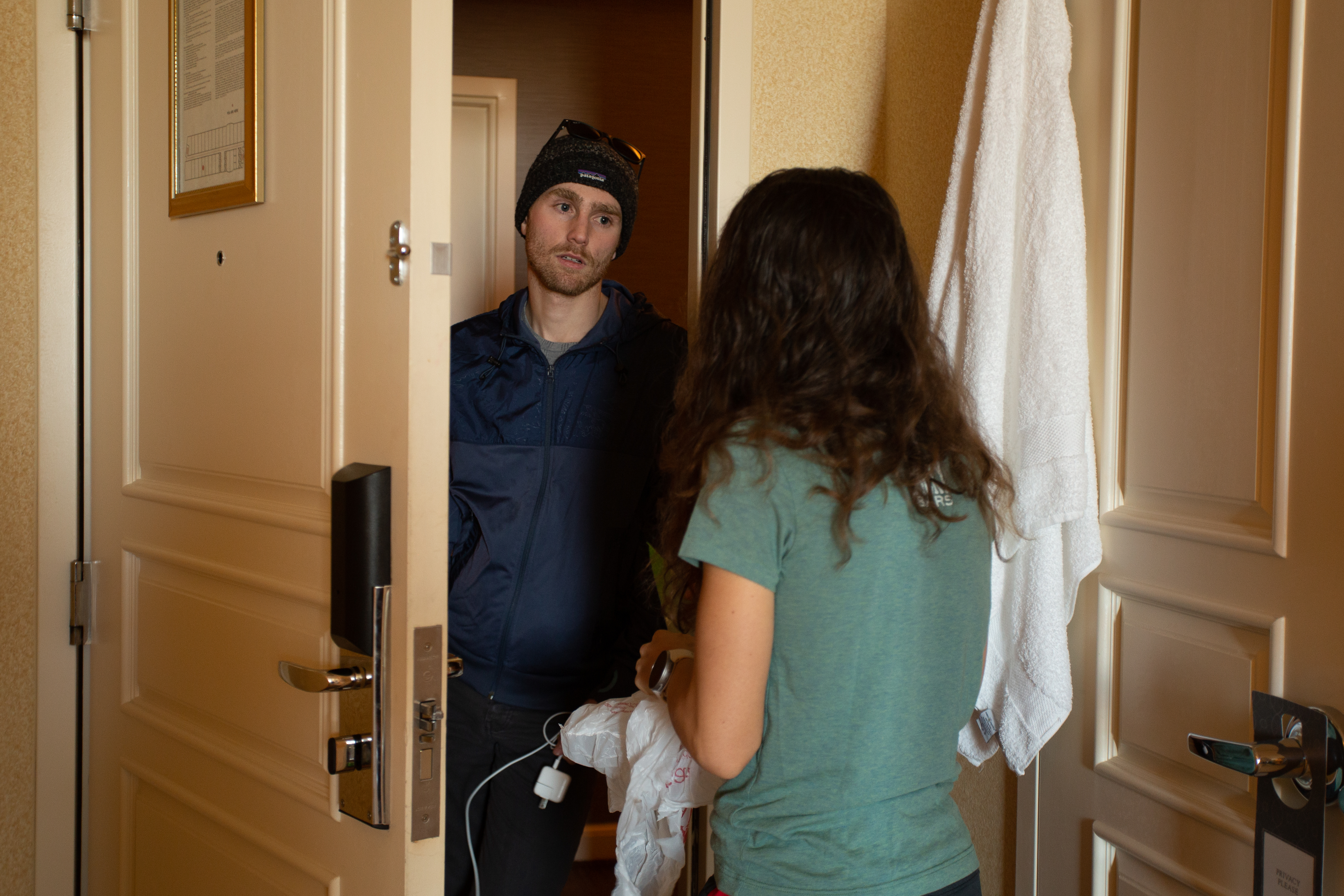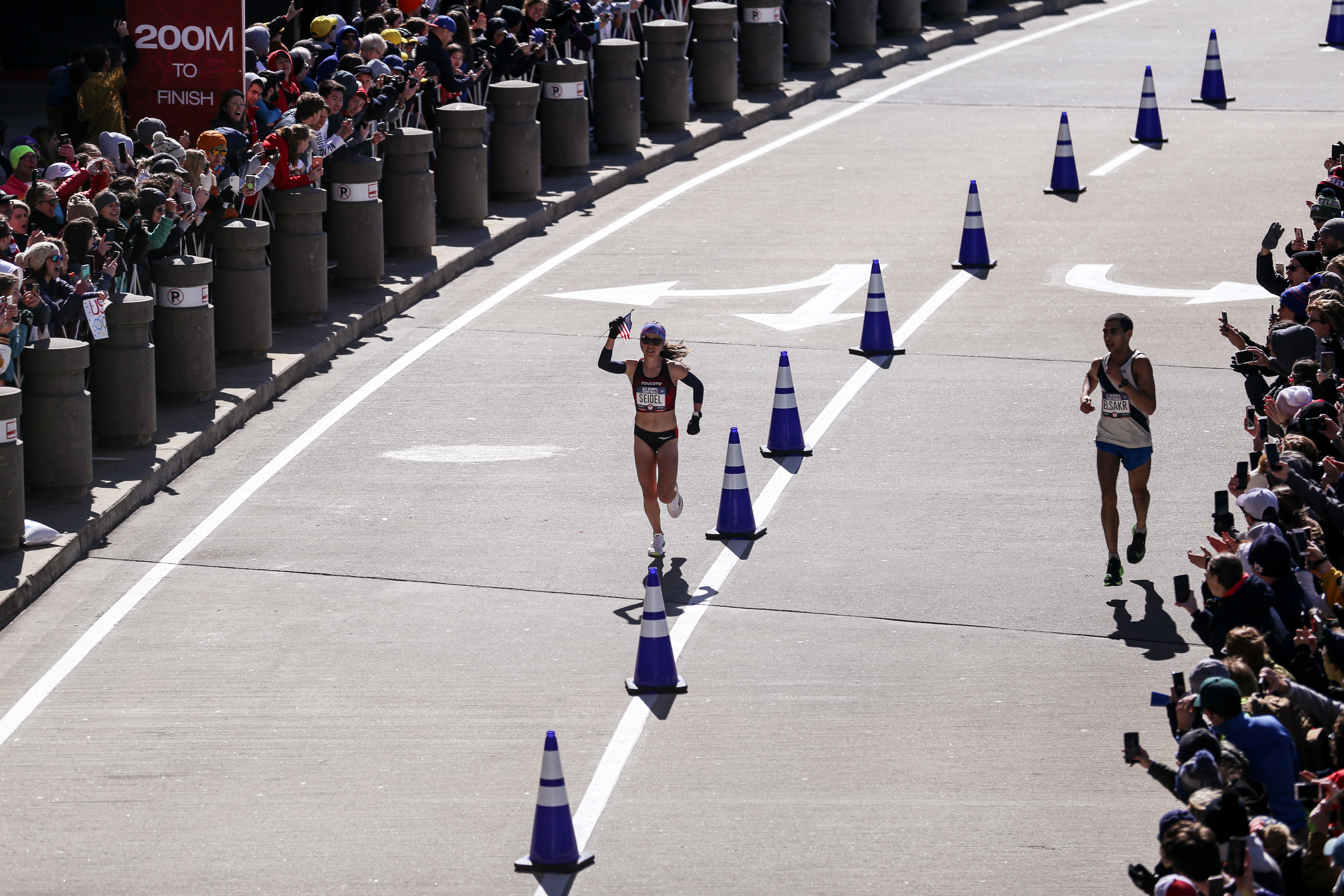

Zero to Hero
Jon Green has never run a marathon.
Jon Green has zero coaching experience.
Jon Green just coached Molly Seidel to a place at the Olympics.
Words by Andy Waterman
Photos by Aisha McAdams
“I sat her down on Friday and said, on a good day you’re third, on a bad day you’re twelfth. She thought she was going to be in the teens or low twenties. Knowing how consistent her training had been and how strong and talented she is as an athlete... I knew she could hold her own. I wasn’t necessarily surprised by the result.”
When Molly Seidel crossed the finish line of the 2020 Olympic Trials in second place, she was the big story of the weekend. Six apocalyptic weeks later, Seidel continues to be a media darling appearing everywhere from the New York Times to specialist podcasts, her story sparking imaginations in this new, competition-starved world. Of course, there’s no such thing as overnight success in an event as brutal as the marathon, and even beginner’s luck requires off-camera dedication, talent, pedigree and planning few of us can comprehend. But her success, apparently from ‘Zero to Hero’, has inspired people - is it possible that we too can come out of lockdown fitter, faster, and more competitive than we’ve ever been before?
So who was directing this show? Surely such a story requires a svengali who’s been there, done that, and got the injuries to prove it. Not this time. When Seidel left her Boston based training group in the fall of 2019, Jon Green, a training partner who graduated from Georgetown in 2018, reached out to her to suggest that he’d love to help schedule workouts and plan her training. What started out as a rolling, fortnightly arrangement, over the course of five months became a place in the Olympic Team.
What’s even more surprising is Green has never run a marathon, never coached another elite athlete, and has zero coaching qualifications. As a result, the coach-athlete relationship is more of a collaboration than an authority figure providing set-in-stone training plans.
“She’s not someone who blindly follows,” says Green. “That’s not the athlete she is and it’s not the athlete I was. She wants to understand. I tell her nothing is written in pen, it’s all in pencil - we change workouts minutes before they start sometimes. Everything is adaptation. And she’s talented enough to know her body - if she wants to push it a little bit, she doesn’t have to ask my permission.”

Seidel and Green initially started working together with an eye on the track team for Tokyo 2020.
“When we were thinking about the training, we were actually setting up to try and get on the 10k team. This marathon was a stepping stone to get stronger for the 10k.” For the marathon specific work, Green called on relationships he had with former college coaches, including Mike Smith, who is now coaching Galen Rupp. “I spoke with Mike Smith a lot and he helped me understand what some of the key parts of a training plan might be. I read Inside a Marathon by Scott Fauble and Ben Rosario, and I relied on what I enjoyed doing in college, and what Molly enjoyed doing in college. I mixed that all together and made a plan that I thought would set her up best for that day, and then going forward, for the 10k.”
As is so often the case, Seidel’s success came off the back of remarkable consistency and consistently unremarkable workouts. “If you look at her training, we didn’t do anything special. It wasn’t even a particularly good build up. I don’t think we went any faster than 10k pace this whole build up. Everything was longer, aerobic work. We only did 12 miles at marathon pace whereas some more experienced women were doing 18 or 20 miles at that pace. So there’s a lot to look forward to. That’s one of the big takeaways Mike Smith gave me. He was like: ‘you want her to be excited for her next build. About what’s next to come and what mileage she can do.’”
Immediately after the race, Green set Seidel the task of going back over her training and writing down exactly how she felt through the cycle. “By writing things down, you can’t romanticize it when you look back at it 12 months later - you write down the good and the bad, and you see those negatives in black and white. That grounds you in your next cycle.”
It’s a tactic that chimes with a man who’s never even used a heart rate monitor with any regularity: “for now, we’re going to rely on feel. Molly should trust Molly more than anyone else in the world. There were a lot of days (in this build up) where she just felt very tired; for the next build up, to be able to reference that could be super useful. There is no smooth sailing.”
The Covid-19 crisis that has swept the world in 2020 and postponed the Olympics for 12 months has sent many athletes scrambling back to the drawing board. Maybe this puts Green and Seidel, who have never left the drawing board, at an advantage over more established athletes who had their schedules set in stone years in advance?
“Obviously no one has experience of this Corona situation, but others may have experience of other setbacks which we just don’t,” says Green diplomatically. So how are they coping with this period of uncertainty?
“From a training perspective, the Olympics being postponed could be really good for us,” he says. “It’s a chance to get more experience. Any extra time we have is going to be a benefit to us. For now we just have the time to enjoy running without any structure, so just doing mileage, which is what we do best.”
The plan is that Seidel will run a fall marathon and experience a different style of racing. But if racing is cancelled for the whole year, that won’t be a big deal either: “We’re taking everything in our stride. Obviously, we love to race - every runner wants to get out and be competitive - but in the end, if we can’t race because of this virus, we can’t race. We’ll keep going forward, and if that means we end up doing a time trial in the fall, so be it. We might start in Hopkinton and try and run to Boston as a time trial. That’s fine. It is what it is. You gotta roll with the punches.”
Rolling with the punches is something we’re all learning to get better at. For Seidel and Green, their resilience as athlete and coach comes from their eagerness to learn and discover just what can be achieved through hard work, adaptability and the enjoyment of working hard on something so meaningful.
For now, as 2020 drifts by, Green’s role is as much about tempering Seidel’s exuberance as setting workouts: “She knows in the end, that if she’s consistent, she’s a danger.”
Let’s hope they both get the opportunity to show just how dangerous she can be in 2021.
This interview appeared in the Spring 2020 edition of METER Magazine.
Since publication Molly Seidel has run the London Marathon, placing sixth with a new PR of 2:25:13

